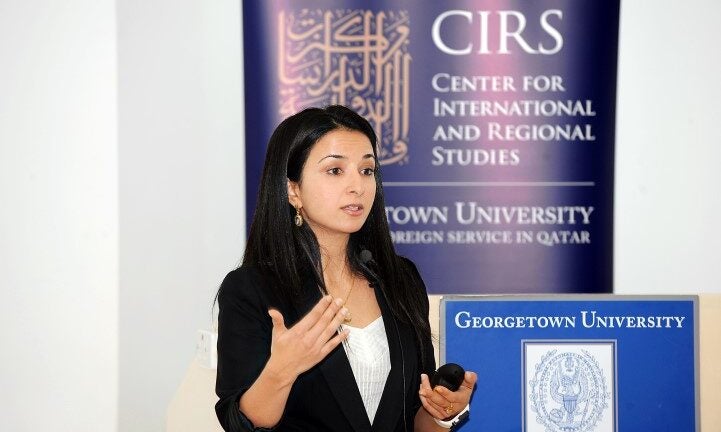Dialogue Series, Race & Society, Regional Studies
Attiya Ahmad on Islamic 'Conversions' of Migrant Domestic Workers in Kuwait

Attiya Ahmad, the 2009-2010 CIRS Postdoctoral Fellow and cultural anthropologist, delivered a Monthly Dialogue lecture on the subject of “Explanation is Not the Point: Islamic ‘Conversions’ of Migrant Domestic Workers in Kuwait” on March 8, 2010.
Ahmad began the lecture by explaining that the anthropological approach toward research topics is to examine the underlying machinations of seemingly casual everyday discourses and activities. She described the task of the anthropologist as recognizing, and then addressing, the unseen complexities of everyday events. Ahmad noted that “through ethnographic methods, anthropologists research peoples and societies as well as underlying economic relations, social processes, and cultural understandings that often are ignored, elided, or taken for granted.”
Whilst conducting preliminary fieldwork in Kuwait on the subject of Islamic movements, Ahmad learned of migrant domestic workers of varying ethno-national origins who were developing new-found Islamic pieties and taking shahada – the Islamic testament of faith. This she discovered is a wide-spread phenomenon in Kuwait, and one that attracts a variety of opinions and debate as to why these domestic workers decided to become Muslim – much of it skeptical. Ahmad explained that “over the course of conducting fieldwork, I came to recognize, in turn, that my interlocutors’ – these South Asian migrant domestic workers that I was researching with – articulations and experiences differed with how others understood them.”
Ahmad conducted long-term ethnographic research, which in part consisted of documenting the everyday activities of female domestic workers resident in Kuwait. She noted that in addition to her own observations, her research findings also account for the ways in which her interlocutors make sense of their everyday lives. Ahmad explained that “the reason we approach our research this way is not only to develop deeper understanding of everyday phenomena and events, but also to document the experiences of peoples and places that are often ignore or considered to be unimportant.”
Ahmad gave background information about the situation of migrant domestic workers in Kuwait. Of varying ethnic, education, and linguistic backgrounds she noted that in Kuwait “these women share a common set of experiences – whether cooking, cleaning, or caring for children or the elderly. The gendered labor they perform is crucial to Kuwaiti’s social reproduction.” Around 90% of Kuwaiti households employ some form of domestic labor, and yet these domestic workers occupy a marginal position within the legal structures and kinship networks of the country, as many studies have shown. Yet, Ahmad argued, scholarship on the exclusion of domestic workers from the social and political life of Kuwait often overshadows other dimensions of these women’s migration experiences in Kuwait – becoming Muslim being one such example.
These women, Ahmad explained, discussed their new-found pieties in terms of their daily activities and intimate relationships within the household, or what one of her interlocutors referred to as “house talk.” Domestic workers experiences of developing new pieties and an interest in Islam were marked not by the extraordinary, but by the everyday. Punctuated by few if any dramatic events, miracles, or visions, domestic workers’ experiences demonstrate the slow, unexpected infusing of incipient Islamic sensibilities, affects, awareness and practices into the folds of their day-to-day relations and activities. Their experiences thus underscore the household as a site of confluence between the affective and immaterial labor related to domestic work and Islamic ethical formation.
As such, Ahmad realized that “rather than focusing on reasons or explanations for why they were converting to Islam – a question that other in Kuwait were preoccupied with – my interlocutors were intent on the question of what their becoming Muslim entailed, and how their new-found pieties were developing through the Kuwaiti households within which they lived and worked.” Thus, Ahmad argued, “the term ‘conversion’ failed to capture the particularities of their experiences. I came to realize that far from an abrupt rejection or transformation of their previous religious traditions, and their lives, domestic workers’ experiences of becoming Muslim are processual. They are characterized by a gradual re-engagement and re-working of their lives through Islam.”
Concluding the lecture, Ahmad explained that there is much public debate about why these women are converting to Islam – much of it speculative and suspect. But if more time is spent examining, scrutinizing, and paying attention to domestic workers’ own articulations, the household becomes a site “through which they come to develop new-found Islamic pieties, and through which they develop new forms of subjectivities, and ways of being in the world.”
Attiya Ahmad recently completed her Ph.D. in Cultural Anthropology at Duke University in the US. Based on over two years of fieldwork conducted in Kuwait, Nepal, and Pakistan, her research focuses on South Asian migrant domestic workers in Kuwait who have converted to Islam, a project that points to the importance of the household as a cosmopolitan space and site of confluence between Islamic reform and dawa movements, and the feminization of transnational labour migration that marks our contemporary period. Dr. Ahmad’s work brings together scholarship on Islamic studies, globalization, diaspora and migration studies, economic anthropology, and political economy.
Article by Suzi Mirgani. Suzi is CIRS Publications Coordinator.